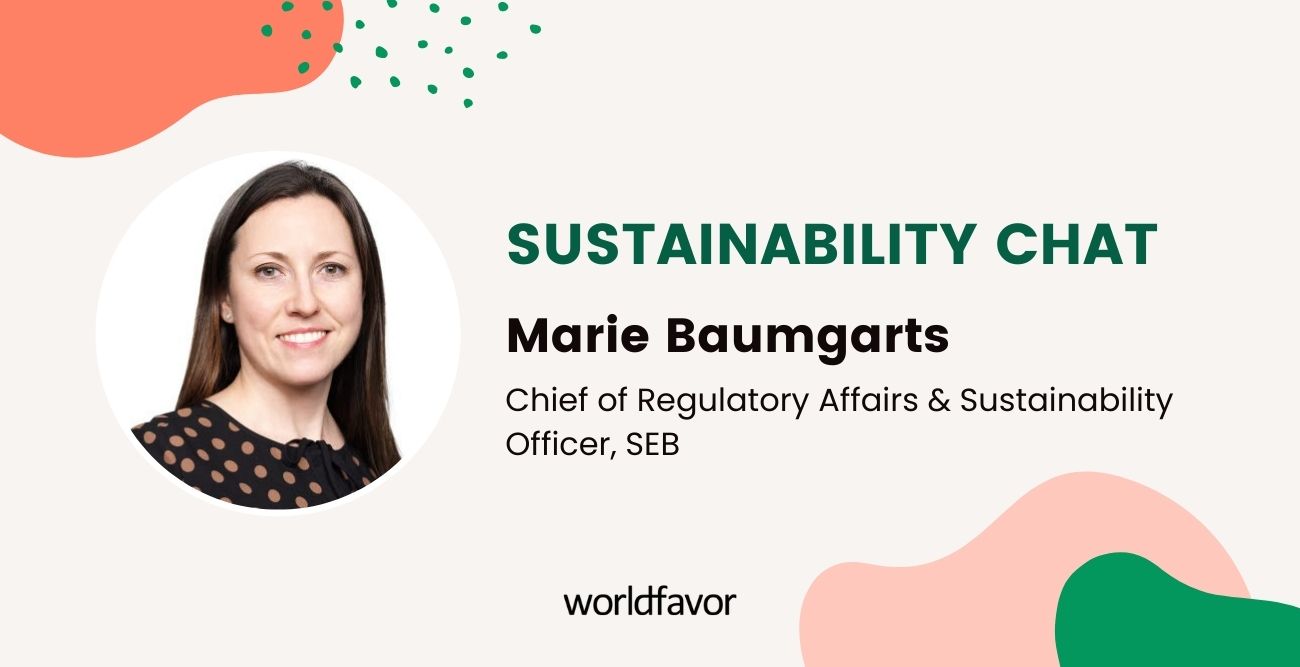Sustainability Chat with Marie Baumgarts at SEB
In our Sustainability Chat series, we speak with leaders and dreamers in the world of sustainability – picking their brains on what drives them, their experiences working in the field, plus all the best tricks of the trade.

We had the opportunity to chat with Marie Baumgarts, Chied Regulatory Affairs and Sustainability Officer at SEB, and a member of the TEchnical Expert Group (TEG), who set the foundation for the EU Taxonomy. Marie has over 20 years of experience working with sustainability in various forms, and she is a specialist in the NFRD. Clearly, this was a golden opportunity for us to dig deeper into the EU Taxonomy and the EU's efforts to shift to a sustainable economy.
The TEG had an important task at hand, what was it like to be a member of the group?
- Mainly, I’m greatly thankful for the opportunity. Although it was almost like having two full time jobs, both the group and the tasks were amazing. I’m very impressed by FISMA’s capacity and intentions. The TEG was mandated with four tasks where one was to recommend climate-related KPI:s, and to do so we had to research every best practice available in the market and create criterias that would suit all types of industries. The most difficult part was that we were meant to come up with the recommended KPI:s, on Taxonomy disclosures for the NFRD’s Non-binding guidelines, before TEG had done the report that would become the Taxonomy.
Why do we need a Taxonomy?
- Before the TEG was created, there was a High Level Expert Group whose task was to create an action plan to reach the SDGs, and the first action on that action plan was to create a Taxonomy to define what an environmentally sustainable activity is. This is the first time ever we have that defined. The EU Taxonomy basically translates the Paris Agreement into more granular thresholds. With the thresholds, the greenness of economic activities can better be translated into financial numbers, and become easier to relate to. What does 2 degrees celsius say for a market, company, division or product, really? The Taxonomy breaks down the SDGs to micro level and shows our performance in percentage. It enables us to compare businesses and their efforts as we now can put a “price” on the environment, something we didn’t even reflect on before in this way.
How do you hope the financial market will react to the new regulations such as the EU Taxonomy?
- There are other regulations that come into force in an effort to reorient capital toward sustainable activities, shifting the EU toward a sustainable economy, and I hope the market will enable this shift and be a part of solving the climate crisis. The market will need to weigh in ESG risks in their decision making processes, and think of the long-term impact of an investment.
The EU Taxonomy currently only requires large companies to report. How do we get smaller companies on board the EU's efforts?
- I believe that some of the companies not required to report will do so voluntarily anyway, since they will be within reporting companies’ supply- and value chains. Hence the reporting company will likely need information for SMEs and by reporting it could be a good way for SMEs to differentiate themselves. It will also push the rest of the market to report as the Taxonomy will hopefully become a measurement of comparison. This will, of course, increase the demand for good reporting softwares that can automate the collection of data, since doing it manually can mean a lot of work.
The EU Taxonomy may feel a bit overwhelming at first glance - do you have any tips for organizations that are affected on how to tackle it?
- You can say that the Taxonomy is similar to a dictionary; if you read the dictionary from A to Z, then yes, it will be overwhelming. However, if you only look up one word or the section of words you’re interested in, then it will make sense. Therefore, you need to know what industry you’re in, and then dive into the annex that shows what codes apply to your industry. And along that way you go.
If you liked this Sustainability Chat and want to stay updated on our future guests, please subscribe to our newsletter. We can guarantee exhilarating chats with sustainability-profiles you don’t want to miss!
Related blog post you might like:





%20as%20the%20deadline%20approaches.%20Learn%20about%20compliance%20requirements%2c%20potential%20delays%2c%20and%20key%20updates..png)

